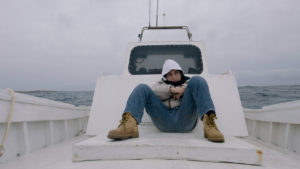 Missed Madison Film Festival
Missed Madison Film Festival
Fire at Sea | Gianfranco Rosi | Italy | 2016 | 113 minutes
Four Star | Madison Public Library | Netflix | Amazon
James Kreul discusses the first documentary to win the Golden Bear at the Berlin Film Festival, Fire at Sea, a portrait of life on the island of Lampedusa, and the front lines of European migrant crisis.
Update 3/11/17: We originally reviewed Fire at Sea as part of our Missed Madison Film Festival in January. but the film will will finally screen in Madison at the Barrymore Theater as part of a benefit for Open Doors for Refugees on Wednesday. April 26 at 7:oopm.
My reviews this week have been shaped by the news of the day. Today’s review of Fire at Sea has been influenced by President Trump’s upcoming executive orders on immigration.
We’re living in strange times, and we need clear eyed documentarians who can present us with images of life as it is lived around the world. With Fire at Sea, filmmaker Italian Gianfranco Rosi presents us with a clear vision, alternately touching and horrifying, of life as it is lived in and around the island of Lampedusa, Italy’s southernmost island. Being 113 miles away from Tunisia puts Lampedusa on the front lines of the European migrant crisis.
Rosi delivers an ambitious and vividly shot observational documentary which allows the images to speak for themselves. The loose structure juxtaposes two main themes: the close-knit community on Lampedusa, which was built on its fishing industry; and the wide-ranging infrastructure that has been built to assist and rescue unfit boats packed with migrants who attempt to make the dangerous voyage across the Mediterranean. The juxtaposition between these two themes at times can be jarring, and some critics have suggested that the crisis does not seem to have much of an impact on the lives of the local residents. This could be a conceptual weakness or strength, depending on how you respond to purely observational documentaries.
Without the assistance of voice over commentary or identifying titles, we are left to assemble the relationships between the people and places that we see. But one central participant guides us. A twelve-year-old boy, Samuele Pucillo, passes the time on Lampedusa as any boy growing up on the island would. We first see Samuele climbing a tree and cutting off a small branch. We soon discover that he has cut the branch to make his own slingshot, and that slingshot becomes a prized possession in other sequences.
Samuele’s sequences foreground the quotidian. People make meals, and eat them (or in Samuele’s case, slurps them). While sitting on the bridge of a boat, Samuele’s father describes and explains his hard life at sea when he was younger. Samuele can’t process the idea that his father spent six months at a time at sea without returning to land. Later Samuele gets sea sick, and his father suggests ways for him to strengthen his stomach for sea travel. These moments are not directly juxtaposed with the migrant rescues, but they do linger in the mind upon further reflection after the film.
While many of the local characters intertwine (many call each other “Aunt” or “Uncle,” I believe regardless of actual relation), only one of them deals directly with the migrant crisis. Samuele’s doctor also provides medical services to the migrants, and his description of his experiences makes explicit the argument that the rescue sequences make without words.
The migrant sequences are foreboding and by the end quite shocking. First we are overwhelmed by the technology involved, mostly associated with the military. We hear frantic radio requests for help, but we soon learn that even rescued boats will often already have fatalities on board. We are then overwhelmed by the supplies and provisions needed to meet basic medical needs. Finally we are moved by the wide range of faces we see in various states of shock, fatigue, and medical distress. Even the lucky ones suffer from some degree of dehydration, and those in the worst shape already look like corpses.
Most of the migrant sequences focus on the later stages of engagement. But the final rescue sequence documents the initial contact and rescue of an overloaded boat. Samuel’s doctor had explained to us the differences between the above deck and below deck passengers, but his words don’t prepare us for the horror below the deck of this boat.
The gap between Samuele’s experience and the migrant and refugee experience is noticeable, and perhaps problematic. But the gap between my life and the migrant and refugee experience is quite noticeable, too. At WisContext, Scott Gordon (of Tone Madison fame) coincidentally posted statistics and details today about refugee resettlement in Wisconsin. The ambiguities of that juxtaposition in the film could be interpreted several different ways, but as I suggested above my response has been shaped by the news of the day. I could not help but think about my relative comfort and how removed I can be from the stories not far from me.
In addition to showing us harsh truths, Rosi also delivers stunningly beautiful images. A nighttime sequence in the forest in which Samuele searches for a bird, lit only with Samuele’s flashlight, is sublime. In an era where more overt argumentation has taken over much documentary filmmaking, it was actually a relief to encounter an observational documentary with a strong visual aesthetic.
Fire at Sea was the first documentary to win the Golden Bear (top prize) at the Berlin Film Festival, and it received an Academy Award nomination for Best Documentary yesterday. It placed number two on Sight and Sound‘s Critics Poll for best documentaries, just behind Cameraperson. But unless it wins the Academy Award, I don’t see it coming for a theatrical run at Madison’s commercial theaters. Perhaps it will play on campus, if we’re lucky.